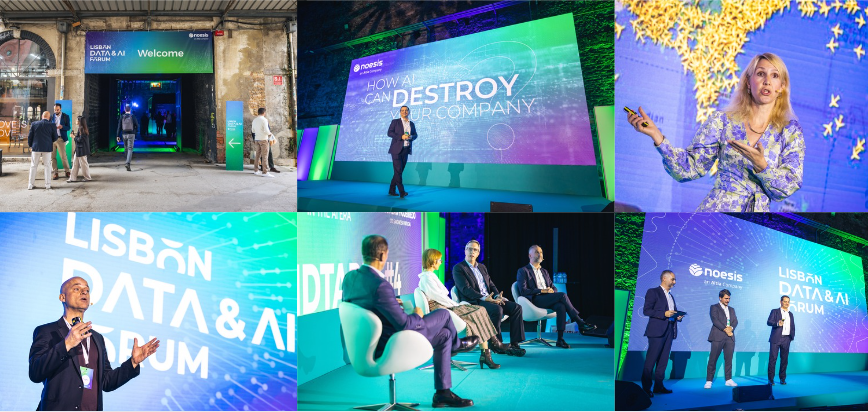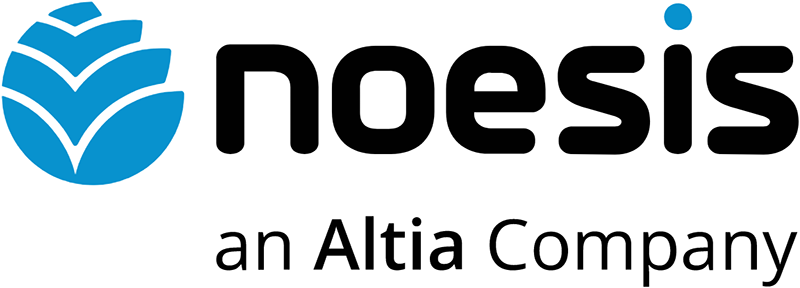
Created in 2017 under the name “Lisbon BI Forum”, the LDAIF emerged from a collaboration between Noesis and Qlik to generate a benchmark event for Data Analysis and Artificial Intelligence. It's a case of saying: mission successful! With the promise of being more innovative from edition to edition, this year's event focused on topics such as Data Quality, ethics and creativity in AI, Cybersecurity in AI, Digital Transformation and many others.
The Welcome Session was marked by our CTO, Nelson Pereira, taking to the stage to introduce us to the panel of experts and the topics to be discussed throughout the day, recalling previous editions and the road traveled until LDAIF became what it is today. This edition brought several new features, namely a new space with an atmosphere that encouraged networking and the presence of our sponsors - Red Hat, Celonis, Qlik, IBM and IDC - and our media partners - Público and IT Insight.
Luís Gonçalves, Data Analytics & AI Director at Noesis, kicked off the meeting with an explosive topic - “How can AI destroy your company?” warning of the damage that an ill-considered implementation of AI can bring to organizations. “We decided not to talk only about the wonderful things,” he said. His keynote aimed to inform managers that objectives must be defined before moving forward with something that ‘could be financially painful’. However, it's not all bad and there are solutions to combat certain unrealistic expectations. According to Luís Gonçalves, there is a set of good practices capable of boosting operational efficiency, which should lead companies to ask themselves, “What do we want?”.
With the idea that Artificial Intelligence is taking away job opportunities and calling human skills into question, Frank Giroux, Manager of Digital Transformation at Bayer, is convinced that “AI will not make people obsolete”. During his keynote, where he spoke to us about large-scale language models (LLMs), he said that LLMs help “workers deal with uncertainty”. In other words, companies still need people to validate content and find the best solutions. This is the case of Bayer Pharmaceuticals, which uses these great models to leverage and transform supply chain management in the pharmaceutical industry.
Fasten your seatbelts! Mina Boström Nakicenovic, Chief Technology Officer at FlightRadar24, gave us valuable insights during her keynote - “From Raw Aviation Data, through Business Value, to Contributions to Humanity”. As one of the world's most recognized flight tracking platforms, FlightRadar24 provides pilots with information on routes, flights, and weather conditions, making it easier for planespotters to identify aircraft. When asked about aviation data's impact on humanity, Mina doesn't hesitate to point out that FlightRadar24 is one step ahead - “We're at points on the globe where no one else is (...) We've managed to save some lives”.
Mistakes are being made, but Gabor Harsanyi, Head of the M&CR Data Office at Ericsson, believes “it's part of the evolution”. During his keynote - “Skip the first draft of your data strategy - go straight to V2!” - he explained the working method that Ericsson has implemented to optimize and improve its business performance. In addition, he tried to alert us to the most common mistakes when creating a data strategy, mentioning that the vast majority of organizations ignore the actual value of data and “neglect compliance, education and retraining of AI teams”.
To complement these keynotes, we prepared a series of roundtables moderated by João Martins (DAAI), Luís Graça (Sales), Sérgio Fernandes (Sales) and Gabriel Coimbra (IDC), where we brought together experts from major Portuguese and international companies - Fidelidade, Novo Banco, Grupo Brisa, Celonis, IBM, EDP, Santander, Banco de Portugal, Banco CTT - to share experiences and insights into the implementation of AI in each organization.
Cybersecurity, the democratization of AI, Data Quality, GenAI and business success, and resilience in the age of digital transformation were the themes chosen to highlight the companies' main challenges and achievements. In common, they all point to the effectiveness and speed of Artificial Intelligence in carrying out numerous tasks such as document analysis, creating draft responses, reading and retaining information, composing procedural documents and many others. The list of benefits is enormous and according to Nelson Pereira, CTO of Noesis, “what could take weeks, now takes a day at most”.
Regarding the future, Bruno Tinoco, from Novo Banco, leaves an important message: “Interactions will be increasingly automated, but we will never lose the human touch” because there are moments that call for human interactions. However, the Noesis CTO explains that “there's no point in making five-year plans or three-year plans, because next year everything could be very different.”
And so another chapter of the Lisbon Data & AI Forum was written - an event that has grown and evolved remarkably, maintaining its commitment to sharing knowledge to drive technological transformation in Portugal and beyond. Our DNA of innovation is to “inspire people and make them go back to their companies to do something different”, says Luís Gonçalves.
Curiosity and anticipation about what to expect from the next edition remain high.


